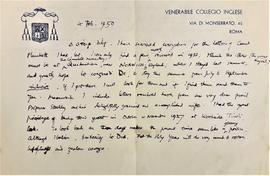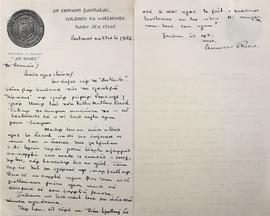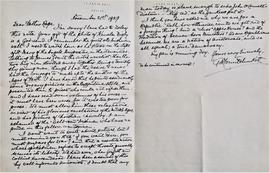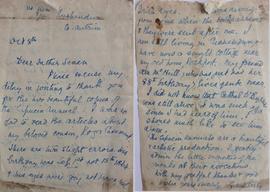A file of letters from leading Irish language scholars, academics, philologists, celticists, and linguists to Fr. Richard Henebry. The file includes letters from Whitley Stokes, Seán Ó Ciarghusa (Seaghán Ó Ciarsaigh), Pádraig Ó Siochfhradha (‘An Seabhac’), John Strachan (Thorndale, Prestwick, Scotland; The Owens College, Manchester), Edmund Crosby Quiggin, John Rhys, Heinrich Zimmer (Chair of Celtic Studies, University of Berlin), Holger Pedersen, Seamus Clandillon (Wolfe Tone Street, Clonmel, County Tipperary), Kuno Meyer (41 Huskission Street, Liverpool), Tadhg Ó Donnchadha (‘Torna’) (Glen House, Carrignavar, County Cork), Ludwig Christian Stern, and Osborn Bergin. The letters include references to scholarly interpretations of Irish texts and proposals for the teaching of the language. John Strachan wrote ‘I made the acquaintance there [Dublin] of Father Dineen, an interesting and energetic person. He is working at a modern Irish dictionary. The thesaurus progresses. Vol. II is nearly printed. There is now only the introduction to write’ (10 Mar. 1903). A later letter from Strachan asks ‘Why, O why do you waste your time over these fruitless bickerings, when you might be doing something useful?’ He adds ‘As to America, it depends, I suppose on how fast the stipend grows, if it is enough to live upon, I should strongly advise you to go, and to stick to Irish and eschew politics’ (25 Jan. 1904). Whitley Stokes wrote ‘Kuno Meyer is tolerably well in health and has induced Sir Antony MacDonnell to contribute handsomely to the support of a school of Irish studies’ (29 Oct. 1903). Osborn Bergin’s letters relate to disagreements with Henebry over Irish language usage. He writes ‘I wish you would not ask me to look over any more of these proofs. Our ideals are too far apart for anything like the “plan of campaign” Dr. Sheehan suggests. There are many kinds of Irish that give me pleasure in the reading, but I object on principle to trying to force an artificial switch back style on the public, with sudden jolts and lurches from 17th century to 19th century and from that to the 10th century and back. No! It won’t do. When I hear people calling you a faddist, I cannot work up much conviction in contradicting them’ (29 Nov. 1908).




